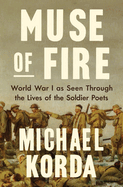
From patriotism to pathos, historian Michael Korda (With Wings Like Eagles) movingly illuminates how the "soldier poets" of World War I experienced their generation's "war to end all wars." Korda explores "how the initial enthusiasm for the war gradually gave way to embittered resignation" for most of the six poets living at "the tail end of the Victorian and Edwardian age": Rupert Brooke, Alan Seeger, Isaac Rosenberg, Robert Graves, Siegfried Sassoon, and Wilfred Owen. Korda begins his free-flowing narrative of their lives with an extended rumination on Brooke, who, at the war's outset, "embodied the national spirit perfectly." His poem "The Soldier," famous throughout the English-speaking world, declares "If I should die, think only this of me:/ That there's some corner of a foreign field/ That is for ever England." After Brooke's death and subsequent obituary by Winston Churchill in the Times, he became a "recruiting symbol" for the British army.
Korda's inclusion of two lesser-known soldier poets, Seeger and Rosenberg, adds depth and dimension to a cast otherwise composed of junior officers and members of the British upper class. Seeger, an American, joined the French Foreign Legion and, like Brooke, was devoted to the war's purpose until his death at the Battle of the Somme in 1916. Rosenberg joined the war out of necessity and "hated it all." He never rose above the rank of private and his poetry was "expunged of patriotism" as it catalogued the war's horrors from an ordinary soldier's perspective. An innovative blend of biography and literary insight, Muse of Fire is a welcome addition to the World War I history canon. --Peggy Kurkowski, book reviewer and copywriter in Denver

